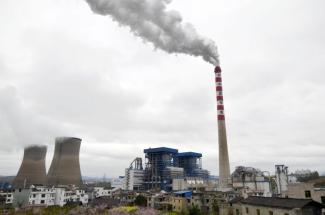Global climate
Decarbonise now

In Bonn, the member states of the United Nations Framework Convention on Climate Change (UNFCCC) worked on the draft of a rule book for the implementation of the 2015 treaty that will come into force in 2020. The rules are to be adopted in December 2018 in Katowice, Poland. COP 24 will put special focus on efforts until 2020 which mainly industrialised countries are responsible for.
There are many encouraging developments. Energy-storage batteries are getting better and transmission grids smarter. Combining different renewable-energy technologies such as wind or solar power with pumped-storage hydropower promises reliable power supply. Moreover, several countries are getting close to 100 % renewable-energy supply.
Focusing mainly on power generation as was done in the past is not enough however: electricity accounts for only 20 % of the world’s final energy consumption, although the share is growing fast. Transportation accounts for 37 % and heating for 43 %. The goal must thus be a decarbonisation of the entire global economy.
Time is short. That was emphasised at COP 23 too. Pilot projects are useful, awareness raising and capacity building are important, and broad-based participation is crucial. But the question is: do we have time to wait for all the good ideas to materialise and show impact? By 2030, 600 of the 800 gigatons global carbon budget we can afford if we want to limit global warming to under two degrees Celsius will already be used up – unless there is a major transition. One hundred percent renewable-energy supply in Costa Rica and Iceland, more efficient coal power plants in China and a few more electric cars in Europe will definitely not suffice.
Many private-sector companies understand these things, but too many politicians still do not. In the USA, major corporations such as Walmart and Google are leading climate action since a climate-change denier took over the White House. Their initiative is called “We are still in” (in the Paris Agreement that President Donald Trump has left). It represents $ 6.2 trillion of the US economy. In Germany, more than 50 companies including global players such as Adidas and Siemens demand that the future federal government make a strong commitment to climate protection and phasing out coal-fired power plants. Germany used to be a frontrunner in regard to renewable energies but is now set to miss its own climate targets due to counterproductive policymaking.
Policymaking remains essential elsewhere too. Regulatory mechanisms and subsidies are indispensable instruments because we do not have the time to wait for market mechanisms to bring about the needed great transformation. Decarbonisation will not make much sense if it only happens after the melting of the polar caps. Scrapping all fossil-fuel subsidies would be a good start. A carbon price to make coal technologies unprofitable could make a huge difference too – preferably at the global level.
It does not make sense that coal mining continues in Germany and that aviation fuels are still exempted from taxes. It is a shame that EU member countries are unable to agree on ambitiously expanding renewable energies and that multilateral finance institutions such as the World Bank continue financing coal-based power generation in developing countries. Not to mention developments in China: the world’s number one greenhouse-gas emitter is a green-power champion, but at the same time it is building many new coal-fired power plants. The People’s Republic would surely like to export its new so-called green coal technology to the whole of Asia. That’s no phase-out. It is greenwashing. This approach will neither protect the climate, nor help humanity.
Katja Dombrowski is member of the editorial team of D+C Development and Cooperation / E+Z Entwicklung und Zusammenarbeit.
euz.editor@fazit-communication.de








